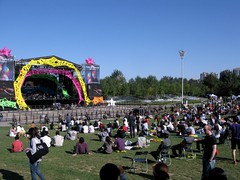MODERN SKY FESTIVAL 2009 We’d been planning to go up to Beijing for a while. The combination of the 60th Anniversary of China’s Communist Party, a city with artificially beautiful skies, and the Buzzcocks playing the Modern Sky Festival in ChaoYang Park in the middle of it all was too much to resist. Of course, the hugely unfortunate cancellation of all 14 international artists from the bill added a sense of mystery. Why had it happened?
The festival itself was a strange combination of steady logistical improvements and a disappointing loss of atmosphere and attendance. We had certainly felt that the move into the shoes of the sadly defunct Beijing Pop Festival in Chaoyang Park would have the masses thronging to the new site, but attendances certainly seemed sparser than at Haidian the year before. Were people put off by the last minute cancellation of those artists (no offense to the Futureheads, Radio 4, Shonen Knife and co., but surely their draw wasn’t that crucial), was it the increase in competition (Zhangbei’s InMusic and Modern Sky’s own Strawberry Festival are both similar in style and in or close enough to Beijing to possibly cannibalize numbers) or are people in Beijing just getting festival fatigue at the series of disappointments and broken promises (Midi’s serial cancellations, Zhangbei’s massive oversell this year, Pilot Records sparsely attended summer series and now Modern Sky falling victim as well)???
We heard a variety of reasons for the “lineup lite”. The best mélange of reasons that we could conclude with was that the Buzzcocks being the band that they are (a couple of banned songs way back in 70’s England and America) led to a closer investigation of all the bands. The organisers had done the licensing through the district (as they have jurisdiction in Chaoyang. They were expected to apply to municipal, but were slow, and eventually had to request an expedited license. The sensitivity of the time period plus the punk nature of the headliner led to an initial proclamation to cancel the whole festival, as there wasn’t time left to examine the application in detail. This was then commuted to “only” a ban on international artists.
Whichever way it went, the festival itself (barring the music) was an improvement on years past. There was an impressive (depending on your point of view) profusion of sponsorship – does anyone else think having 4 apparel sponsors, 3 of which compete in the same demographic (and in the case of Converse and Diesel, touting the exact same bands in their campaigns) was strange? Diesel looked like they had spent the most money – they owned the top of the small hill at the back, with a slightly bizarre black and yellow outdoor lounge/ disco area, complete with UV room and museum. Honestly, the space was a little atmosphere-less – why do brands so often find it so difficult to create something that feels genuine and sticky?
Converse had a slightly downsized, but more authentic room where kids could audition for their moment of fame in the latest Queen Sea Big Shark video, Dickies seemed happy with crew t-shirts, and Hermes (yes, that Hermes) had the most enormous shipping container/ makeup centre/ scarf morgue right in the centre of the mainstage audience. Top marks for ridiculous sponsorship plan was Kirin, who either consciously banned sales of their own beer to introduce people to their alcoholic grape juice and chardonnay in a can, or were banned from selling alcohol and somehow managed to sneak in the aforementioned sweet booze under a soft drink license. Whatever the truth, the lack of beer affected the Laowai enjoyment of the festival immeasurably, until a sizeable crowd discovered there was actually Kirin beer being served in the VIP lounge. There was a significant nod to green, which was great to see. Similar to the recycling efforts that we have seen many times in Japan, there were happy people standing in the bins themselves showing you how to recycle your rubbish. Food choice was definitely down on previous years (space issues?) and all in all, Chaoyang felt at once claustrophobic and under filled with options. We have to say we prefer the Haidian venue as a pure festival site.
As for the music, of course the lineup was weaker without the international bands. We saw Arms and Legs, due to play on the first day, looking very, very upset and angry about being in China without anywhere to play (can you blame?), but the Chinese bands did their best to step up. PK14 owned the main stage with their most commanding performance yet. Yang Haisong, always a charismatic front man, is now assuming a rock God persona – wiry and perpetually dressed in black, his atonal voice is not to everyone’s preference, but there were a couple of thousand people in front of him reacting joyously to every move, every note. Of the others, the Bigger Bang have potential, but lead singer Pupi was clearly overawed by the occasion. A 3pm timeslot didn’t help. Second Hand Rose did what they always do – bring the Northern plains down to the cities. They are an awesome prospect for the uninitiated. The rest tried gamely, but should clearly be kept away from main stages for the indefinite future. Reports from the remaining days of the festival have trickled in, with no apparent stand-outs. We even heard from a set of normally festival-crazy local band loving Chinese friends that they instead opted to travel to Tianjin for a bit of more traditional Chinese culture – a cross-talk (相声)festival. Which brings us back to the question – whence the live music fatigue in Beijing?




